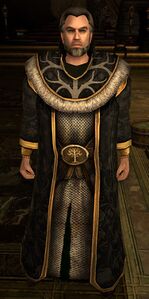Denethor
For the king of the High Elves of Ossiriand, see Denethor of Ossiriand.
| ||||||||||||||
|---|---|---|---|---|---|---|---|---|---|---|---|---|---|---|
|
Description
Denethor (Denethor II) son of Ecthelion II, is the Steward of Gondor during the War of the Ring. He is the 26th and final Ruling Steward of Gondor. In his keeping was the Anor-stone, the palantír of Minas Tirith.
Quest Involvement
- [19] Before the Shadow, Book 2, Chapter 3: Instance: A Long Way From Gondor
- [100] Vol. IV, Book 4, Chapter 8: What the Steward Saw
- [100] Vol. IV, Book 4, Chapter 12: Instance: The Darkest Hour
- [105] The Silent Street -- Tier 1 - Fellowship
- [105] The Silent Street -- Tier 2 - Fellowship
Lore
- Denethor II was the first son and third child of Ecthelion II.[1] He had two older sisters: Terenis and Vanyalos, the latter getting married to Forlong, the Lord of Lossarnach (while Denethor's wish had been for the former to marry Forlong).
- As stated in the early chapters and the Appendices of The Return of the King, he was widely considered a man of great will, foresight, and strength. However, he failed to reach out to his people, who flocked instead to Thorongil, an outsider who served Denethor's father with great renown. Thorongil vanished from Gondor four years before Denethor would succeed his father as Ruling Steward. Thorongil (who was secretly Aragorn, Chieftain of the Dúnedain of the North and hence a claimant to Gondor's throne) had advised Ecthelion to put faith in the wizard Gandalf, whom Denethor distrusted.
- He married Finduilas, daughter of Prince Adrahil of Dol Amroth and sister of Imrahil. She gave birth to two sons, Boromir and Faramir, before dying when they were ten and five years old, respectively. Denethor never remarried, and became more grim and silent than before.
- In a conversation with Pippin just before the first meeting with Denethor, Gandalf described Denethor as
- Following that meeting, after Pippin has sworn fealty to Denethor, Gandalf further commented:
- "He is not as other men of this time… by some chance the blood of Westernesse runs nearly true in him, as it does in his other son, Faramir, and yet did not in Boromir. He has long sight. He can perceive, if he bends his will thither, much of what is passing in the minds of men, even of those that dwell far off. It is difficult to deceive him, and dangerous to try."[2]
From a Usenet post circa 2007 - rec.arts.sf.written
"Denethor wasn't remotely short of common sense. If anything, it was his common sense that led him to be suspicious of help from half-legendary peoples and putative war-captains whose primary claim to fame was to be descended from the line that presided over the end of the North kingdom most of a millennium ago. (Imagine Gordon Brown being faced with someone claiming to be the heir of Arthur. a) Why believe him? b) If he is, so what?)
"Parenting issues aside, his political instincts were well-suited to realpolitik and normal military and diplomatic matters, and he'd run Gondor well for a generation. His instinct to use the most powerful weapon in the world as a weapon, or failing that to hide it away, rather than to attempt to send it COD to the one place in the world that it could immediately win the war for the Enemy, wasn't bad judgment for those not overly trusting of Providence. Gandalf's plan was the Hail Elbereth pass. Denethor's strategy was a probable loser (and he knew it-- hence his despair) but it was the straightforward sensible option.
And Faramir's coming into contact with the one thing that could forestall Gondor being ground down by superior numbers and sending it on to try to get past Sauron's garrisons would be enough to madden even someone not grieving his favored son. Even if it would work in theory, you might as well send an untrained private who knew no German on a mission to walk to Berlin in 1943.
"Denethor was too proud to declare himself an illegitimate king rather than a legitimate steward, and said as much to Boromir. (Who probably would have liked to be King.) And sure, he liked power more than was ideal. But there are defensible reasons to question handing over supreme executive power to someone whose ancestors have been camping out in the North for a time span comparable to the distance between us and the Norman Conquest, on the eve of a war that threatens the existence of the state. Or even to risk a panicked citizenry flocking to a charismatic self- declared savior to the detriment of things like actually manning the defenses and making the Enemy pay for every inch of ground. (In practice, Aragorn knew what he was doing. What guarantee could Denethor-- even a Denethor utterly free of self-interest-- have that that would be the case?)
"Denethor was wrong, because he lacked the virtue of Faith and gave into the sin of despair, and because he trusted only in worldly strength. In other words, he was reasonable-- up to the point when his nerve broke, and he decided that it was better to die than to face whatever fate Sauron could cook up for him-- when the right choices were to be unreasonable: to ride, like Theoden, singing against impossible odds; to trust, like Faramir, in hopeless plans; to depend, like Gandalf, on the impossible.
"(And it was impossible-- even having reached the heart of the Enemy realm through thousands of soldiers and worse monsters, in the event Frodo couldn't throw the Ring into the Fire. Only "chance, if chance you call it", prevented disaster. That's not a reasonable thing to bank on.)"

